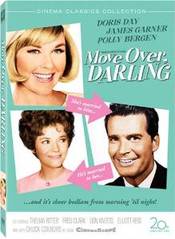
Quite often in popular culture (such as on a local radio show last week), I’ll hear someone talking about, “Well, when I was young, we did [insert specific potentially dangerous action]. It was fine then, so it’s fine for my kids, too.” However, that’s really poor logic. While many of us may have survived the stupid things we did in our youth, other children did not. They’re not here to tell their sides of the story, and they didn't live long enough to have to children to stop them from doing the same thing.
While watching Move Over, Darling (1963, starring Doris Day, James Garner, and Polly Bergen with minor roles by Don Knotts and John Astin) recently on Netflix, I was confronted with one of those situations. As the early scenes of the movie unfold, the young daughters of the lead characters are playing in a pool unsupervised. These girls are between 5.5 and 6 years old based on the timing of them being teething infants when their mother was lost at sea five years prior. In the movie, no one blinks twice about the fact that these girls are playing unattended in a private swimming pool in the back yard, but the modern mother in me had an “aack!” moment over it.
Clearly social values fifty years ago didn’t see unattended young children in a pool as problematic, and I’m sure it’s one of those things that people said to themselves, “When I was young, we did it without a problem.” However, that’s not true for many others. The American Academy of Pediatrics states that “drowning rates have fallen steadily from 2.68 per 100,000 in 1985 to 1.32 per 100,000 in 2006. But drowning continues to be the second leading cause of death for children ages 1 to 19, claiming the lives of roughly 1,100 children in 2006. Toddlers and teenaged boys are at greatest risk.” The AAP warns against leaving young children unattended by a pool that doesn’t have a sufficient fence around it. While these young girls clearly knew how to swim well, they weren't old enough to be trusted to make good life (or death) decisions at all times.
Examples like this of formerly “safe” practices aren't hard to find. I tried to watch Mad Men recently and utterly failed, giving up after only a few episodes because I was both so bored with and disturbed by the show. However, in one of the early episodes, two mothers are talking in the kitchen while their kids play elsewhere in the house. The female owner of the house calls for her daughter who shows up with a dry cleaning bag on her head. I’m sure I was not the only who cringed (as the writers wanted us to) when I saw that. However, the mother says nothing to the daughter about suffocation risks and instead warns her that she better not have put the clean dry cleaning on the floor to play with the bag. The obvious parenting priorities: unwrinkled clothing over a child not suffocating!
In a recent article for The New Yorker, author Tad Friend meets with Matthew Weiner, the creator of Mad Men. Weiner asked Friend what he thought Mad Men was about, to which Friend replied, “Bad parenting.” Weiner replied, “’No. No. That certainly wasn't the focus…. Look, there is definitely some bad parenting in the show, but there’s no drama in good parenting. And plenty of the bad-parenting moments didn’t come from me.’” Yet when I watched the few episodes of the show that I could handle, if you asked me the top five things I thought the show was about, it would have been the huge changes in parenting for the better since the 1960s.
Even in my own lifetime as a child of the 1970s and 1980s, bicycle helmets and seatbelts are two very common changes that have occurred. I never wore a bicycle helmet as a young child; no one I knew did. Seatbelts were something that kids of my generation wore sometimes, maybe. It wasn’t a steadfast rule. I often sat in the front seat as a young child and just put the shoulder strap behind me. My ex-husband’s family didn't even own a car that would safely hold four children: They just shoved the two youngest into the wells on the floor in the backseat. And while one could argue that both my ex-husband and I made it to adulthood, there were many others of our generation who didn't.
The next time you find yourself having a defensive reaction where you say, “Well, when I was young, we did it that way and things turned out fine,” take a moment to decide why you are responding in that way. Was what you did truly safe? How many other children didn’t make it to adulthood because of that practice? Will not engaging in that action make the lives of the next generation less worthwhile? The answers may surprise you when you stop to think about the bigger picture rather than trying to recreate a potentially dangerous part of your childhood for your children.
© 2015 Elizabeth Galen, Ph.D., Green Heart Guidance, LLC
 RSS Feed
RSS Feed